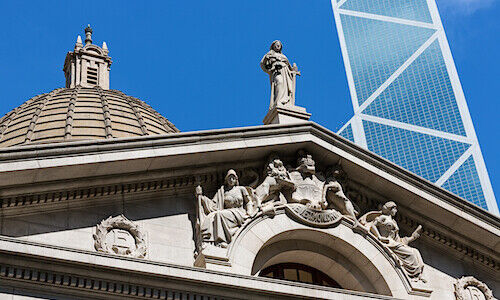Ex-Judge Says Hong Kong «Becoming a Totalitarian State»
A former overseas judge said that Hong Kong’s rule of law is «profoundly compromised» by a new environment that he believes is causing the city to transform into a totalitarian state.
In an opinion piece published by the «Financial Times», former overseas judge Jonathan Sumption, who resigned last week, said that Hong Kong’s rule of law was deteriorating due to a new political environment created by China.
«Hong Kong, once a vibrant and politically diverse community is slowly becoming a totalitarian state,» he said. «The rule of law is profoundly compromised in any area about which the government feels strongly.»
Rejecting the Budget
Sumption’s decision to resign followed a May 30 ruling by Hong Kong’s High Court against 14 politicians over their organization of unofficial primaries to select a list of candidates for elections in the city’s Legislative Council (Legco). The candidates' plan was to «demand universal suffrage and other concessions as a condition of approving the budget».
«The Basic Law (Hong Kong’s constitution) provides that universal suffrage is the 'ultimate aim'. It expressly authorizes Legco to reject the budget, and provides that if it does so twice, the chief executive must resign,» Sumption explained.
May 30 Ruling
Ultimately, the High Court convicted the politicians of «conspiracy to commit subversion».
«Nonetheless, the High Court decided that rejecting the budget was not a permissible means of putting pressure on the chief executive to change his policies,» Sumption said.
«He would certainly reject the majority’s demands, they said, and so would have to resign. That would interfere with the performance of his functions. The result is that Legco cannot exercise an express constitutional right for a purpose unwelcome to the government. Putting a plan to do this before the electorate was branded a criminal conspiracy. The maximum sentence is life imprisonment, the minimum 10 years.»
Three Problems
According to Sumption, many judges are «honorable people with all the liberal instincts of the common law» but they have to operate in «an impossible political environment created by China». He cited three key problems that judges are facing.
Firstly, their freedom of action is «severely» limited by the National Security Law. Secondly, their decisions can be revised by «interpretation» in China if Beijing disagrees with a ruling. Thirdly, there is «paranoia of the authorities».
«I was an overseas judge of the Court of Final Appeal until my resignation last week,» Sumption said. «I remained on the court in the hope that the presence of overseas judges would help sustain the rule of law. I fear that this is no longer realistic. Others are less pessimistic. I hope that they are proved right.»
CE Response
In response, Hong Kong chief executive John Lee said judges should focus on the law, rather than politics.
«Judges' professional expertise is on law, based on his legal knowledge and experience. Judges' professional expertise is not on politics,» according to a report by government media outlet «RTHK» citing Lee. «A judge is entitled to his personal political preferences, but that is not a judge's area of professional expertise.»



























